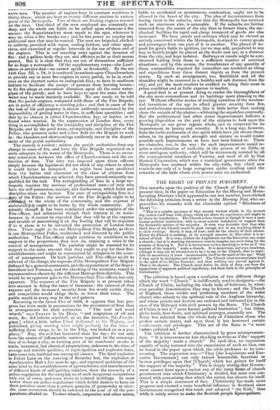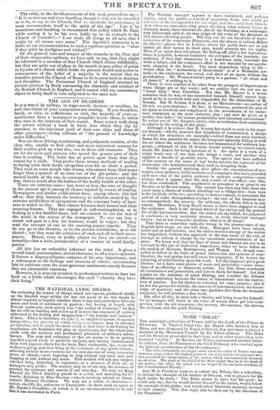THE RIGHT OF PRIVATE JUDGMENT.
One remarks upon the position of the Church of England at the present time, in the paper on Education for the Mining and Manu- facturing Districts which appeared in our last number, have elicited the following criticism from a writer in the Morning Post, who su- perscribes his remarks with the charitable epithet " Blindness of Heart"— "This is a notable specimen of that secular wisdom which, in the present day, makes itself busy with things which are above its cognizance, and ought to be above its interference. The Church is here treated as though it were a mere human political institution, with no more certain foundation or support than the favourable opinion of the majority. It were very desirable that they who think thus of the Church would be good enough not to say anything about it in their writings. Surely it may, at least, look for the charity of their silence. Either the Church is nothing, or its strength consists in this—that it is or- dained of God. It is true, neither the Legislature nor the Executive can make a church ; but it is shocking irreverence even to imagine any such thing for the purpose of denying it. But it is irreverence no less shocking to write as if' the support of the majority ' made a church. It is monstrous, and even insulting, (though it may not be intended so to be,) to say to the Church, that to main- tain its ascendency it must ' accommodate itself to the spirit of the age.' What if that spirit be irreligious and wicked ? The Church must accommodate itself to the spirit of its Divine Founder, and then nothing can prevail against it. That is its charter. The Church must derive its ideas of duty, not from the suggestions of apparent political expediency, but from faith in the principles of Christianity."
The criticism is based upon a-confusion of two different things which the word " Church " is indifferently used to designate,—the Church of Christ, including the whole body of believers, by what- ever peculiar denomination they may be known ; and the Church of England, those visible and professing members of the wider church who submit to the spiritual rule of the Anglican hierarchy, and whose priests and doctors are endowed and intrusted (as in the case of the Bishops) with civil powers by the State. The Church of Christ is not a " mere human political institution"; but tithes, glebe-lands, first-fruits, and spiritual peerages, assuredly are. The State has selected from the whole body of Christians those who profess certain tenets, and upon them it has bestowed certain emoluments and privileges. This act of the State is "a mere human political act." The criticism is further characterized by gross misrepresenta- tion. " It is irreverence no less shocking to write as if the support of the majority' made a church." No such idea, no expression capable of being tortured into the enunciation of such an idea, can be found in the paper upon which the critic professes to be com- menting. The expression was—" They [the Legislature and Exe- cutive Government] can only intrust honourable functions or bestow privileges upon that [Church] which has gained for itself the support of the majority." This is simply stating that Govern- ment cannot force upon a nation any of the many forms of chucrh government into which Christianity is divided, but must rest con- tented with patronizing that which the nation has chosen for itself. This is a simple statement of fact. Christianity has made more progress and exerted a more beneficial influence in Scotland since Government recognized this truth and adopted " the Kirk," than while it vainly strove to make the Scottish people Episcopalians.
The critic, in the fervid paroxysm of his zeal, proceeds to say- " It is monstrous and even insulting, though it may not be intended so to be, to say to the Church, that to maintain its ascendancy it must accommodate itself to the spirit of the age." Can it be monstrous and insulting to recommend that policy which St. Paul, while stating it to be his own, holds up as an example to the Church of Corinth ?—" I am made all things to all men, that I might by all means save some." The Apostle's statement is as liable as our recommendation to such a captious question as " what if that spirit be irreligious and wicked ?"
Of the general tone and temper of the remarks in the Post, and of their vituperative epithets, we have only to say, that they might be tolerated in a member of that Church which claims infallibility, but they are quite out of place in the mouth or pen either of priest or layman of a church which holds its present wealth and power in consequence of the belief of a majority in the nation that its founders proved the Church of Rome to be in error both in doctrine and discipline. The Protestant Church of England attained its present position by freely canvassing the character and conduct of the Romish Church in England, and it cannot with any consistency object to being itself in turn subjected to the same test.



























 Previous page
Previous page